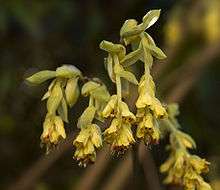Corylopsis
Corylopsis is a genus of nearly 30 species of shrubs in the witch hazel family, Hamamelidaceae, native to eastern Asia with the majority of species endemic to China but with some also in Japan, Korea, and the Himalayas. This genus is also known from the extinct species Corylopsis reedae described from Eocene leaf fossils found in Washington State, USA.
| Corylopsis | |
|---|---|
 | |
| Corylopsis spicata in flower | |
| Scientific classification | |
| Kingdom: | Plantae |
| Clade: | Tracheophytes |
| Clade: | Angiosperms |
| Clade: | Eudicots |
| Order: | Saxifragales |
| Family: | Hamamelidaceae |
| Subfamily: | Hamameloideae |
| Tribe: | Corylopsideae |
| Genus: | Corylopsis Siebold & Zucc. |

They grow to 2–6 m (6 ft 7 in–19 ft 8 in) tall, often with a crown wider than the shrub's height. The leaves are ovate with an acute apex and a serrated margin, 4–20 cm (2–8 in) long and 3–15 cm (1.2–5.9 in) broad. The flowers are produced in late winter in pendulous racemes 3–9 cm (1.2–3.5 in) long with 5-30 flowers; each flower has five pale yellow petals, 4–9 mm long. The fruit is a dry capsule 10–12 mm long, containing two glossy black seeds.
- Selected species
- Native to China unless otherwise indicated
|
|
Cultivation and uses


They are often grown in gardens for their very early, yellow flowers. They do have weak branches though, which are often damaged by heavy snow loads. Corylopsis prefers to grow in semi-shade or shade, protected from strong winds. It grows best on humus-rich soils. The sweetly scented flowering branches keep well in a vase. Corylopsis also makes good bonsai plants, especially C. pauciflora.
References
- Radtke,Meghan G., Pigg, Kathleen B., & Wehr, Wesley C. (2005); "Fossil Corylopsis and Fothergilla leaves (Hamamelidaceae) from the Lower Eocene flora of Republic, Washington, U.S.A., and their evolutionary and biogeographic significance" International Journal of Plant Sciences 166(2):347–356
- Flora of China: Corylopsis